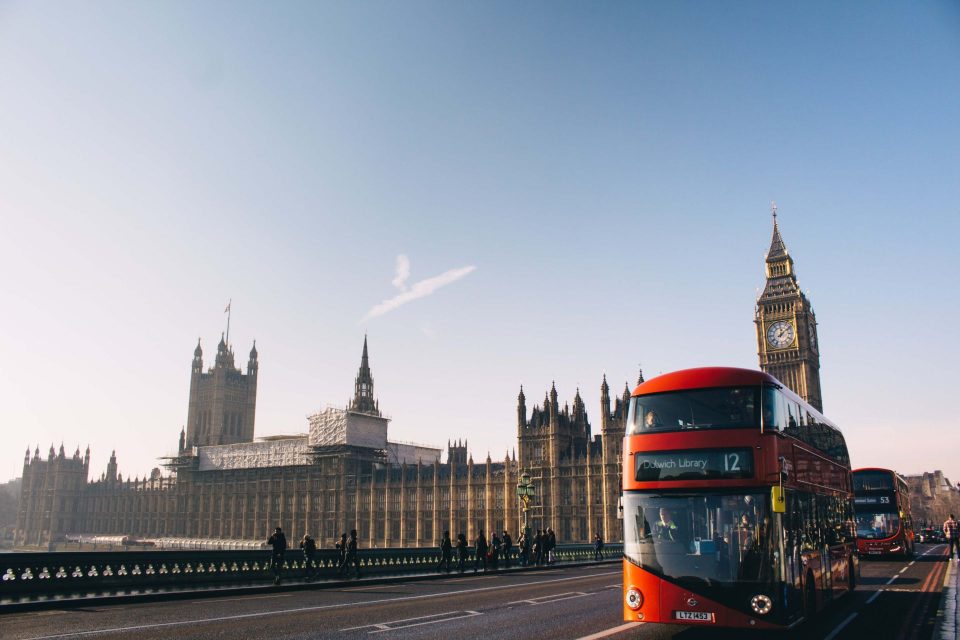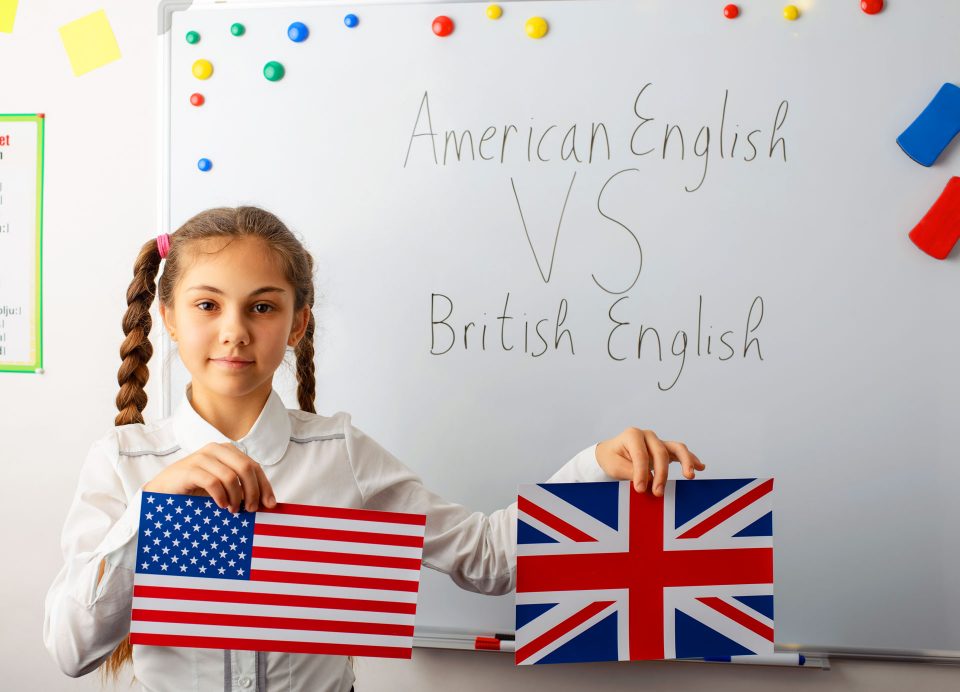British English vs American English Differences: Spelling, Pronunciation and More
The accent plays a huge part in making British English and American English different, but what else is there? Let’s see.
What’s your English accent of choice? Pick your favorite.

One language, over one billion speakers, and countless ways to speak it. You guessed it. We’re talking about the fascinating English language. So the big question is: with so many speakers, how many English accents are there?
Well, somewhere over 40 english accents in the United Kingdom, but worldwide we can’t know for sure. As the saying goes “so many countries, so many customs”, so it’s fairly difficult to point the finger at one number. Maybe even you have your own English accent. But that doesn’t stop us from putting together a list of the most notable English accents of the worl… uhm, universe. From British to American and even Aussie accent, let’s make the English accents inventory and find out how many ways of speaking English are there (at least roughly).
Lexico explains that an accent is “a distinctive way of pronouncing a language, especially one associated with a particular country, area, or social class”. Interesting, isn’t it? That is why you and maybe some of your friends in a particular area can create a new English accent of your own.
But chances are that one’s already used. As you probably already know, England isn’t short on accents. Travel north to south and it’ll give you the impression locals are speaking a whole new language.
Before moving to our actual introduction to various English accents and dialects, take a few moments to think about which one is your favorite? Have you always dreamed of speaking English like the Queen of the United Kingdom? Or maybe like rugged Mr. Jamie Fraser from Outlander? Or are you a more American-oriented person and would go for a Matthew McConaughey-Texan style accent? So many fascinating choices!

Oh, the Brits! Judging by the British English accent you think they use, they are so royal, so sophisticated – or as they would presumably say – so posh. But in reality, things are not entirely so. As we already hinted, the UK is incredibly rich in accents. Not everybody speaks British English like Benedict Cumberbatch or Martin Freeman. No, sir. A single British accent does not exist.
Lucky for you, the British Library is an incredible resource for people such as yourself who are interested in English accents and dialects. Here you’ll be able to search by country or by the map and even listen to how Britons speak all over the country. After just a quick search, I found no less than 77 audios of speakers from across the UK, chosen to represent different accents and dialects in England, Wales, Scotland, and Northern Ireland. That’s pure gold, lad! Enjoy!
Let’s get down to work and review some of the most notable British accents you need to know from the British Isles and Ireland.
If you are not a Brit but tried to put on a British accent at some point, the RP accent is most certainly what you were going for. Also known as the Queen’s/Kings’s English or Oxford English, RP is the closest you can get to a “standard accent” in the UK.
The most important features of Received Pronunciation are non-rhoticity – meaning that the “r” at the end of the word isn’t pronounced and “mother” will sound like “muhthuh” – and trap-bath split. In broad terms, this means that certain words like “chance”, “bath”, “can’t”, and “dance” are pronounced with the long A as in “father”.
To hear RP in action, watch a lot of BBC or travel to Oxford, Cambridge, or Brighton and chat with the locals.

Additionally, there’s even a heightened version of RP which is only really spoken in television or film. Think of Downton Abbey for reference.
Cockney is perhaps the second most famous British English accent after RP. Born as the dialect of the working classes in the East End of London, Cockney is well-known for cockney rhyming slang which is… fairly difficult to understand by outsiders.
Still regarded as a marker of “true” East End London heritage, Cockney accent is characterized by the glottal stop where the letter “t” is pronounced with less intensity, so words like “better” sound more like “be’uh”, and the tendency to swap the “th” sound for “f”, drop the “h” in front of words like “head” and elongate vowels like “a” and “e”.
To hear the Cockney accent in action, watch the movie Snatch – specifically Jason Statham’s character.
Awww, doesn’t “Brummie” sound really cute?
Made famous worldwide “by order of the fo**ing Peaky Blinders”, the Brummie accent, or more formally the Birmingham dialect, was actually one of the most ridiculed English accents in the United Kingdom. Can you believe it?

But I guess it’s true what they say: he who laughs last, laughs best. Now the Brummie accent has millions of fans all over the world because everybody wants to speak – and dress – like Tommy Shelby.
Born from the language contact between Scots and the Standard English of England in the late 1700s, the Scottish accent is a rhotic accent. This means that the “r” is pronounced and rolled. Additionally, this accent is also characterized by elongated vowel sounds and the glottal stop (the letter “t” is not pronounced between vowels).
To hear the Scottish accent in action, you can take a trip to Edinburgh, Glasgow, or watch the animated movie Brave which features multiple types of Scottish accents.
The Yorkshire dialect (also known as Yorkie or Yorkshire English) is an English accent of Northern England spoken in Yorkshire, the largest county in the UK.
Home to Leeds, York, and Sheffield, the Yorkshire accent is characterized by a different pronunciation of the letter “u”. Rather than pronouncing it “uh”, you’ll say “ooo”, so “blood” is pronounced “blohd” and “cut” – “coht”.
Additionally, words that end in “ee” are pronounced ‘eh’, for example, “happy” will sound more like “happeh” with the Yorkshire accent.

Because this accent has roots in Old English and is influenced by Old Norse, the language of the Vikings, you’ll hear it used in many fantasy TV shows such as Game of Thrones.
If you watched at least one episode of Outlander, the Northern Irish accent will probably be your favorite on this list. Once you get to know Jamie Fraser and his lads, you can’t help but try to imitate their way of speaking.
Distinctive thanks to its often funny slang (“wee” means “small”, “lassie” means “young girl”), Northern Irish was influenced by the lowland Scots language and is characterized by an exaggerated “r”, especially at the end of some sentences.
Officially a country of its own, Wales also has a different language which heavily influences the Welsh English dialect. As you may expect, this is especially true in households where English is the second language and people speak it with a thick and breathy accent.
Fun fact: Llanfairpwllgwyngyllgogerychwyrndrobwllllantysiliogogogoch (yes, I copy-pasted that) is the name of a village in Wales which Naomi Watts, who has lived in Wales herself, brilliantly pronounces during one of her visits to Jimmy Kimmel Live.
The West Country English accent is used by the native population of South West England, the area which includes the counties of Cornwall, Devon, Dorset, Somerset, Wiltshire, the City of Bristol, and Gloucestershire.
What’s truly fascinating about this accent is that its speakers – especially in Dorset – often use the old form of the verb “to be”. Thus, instead of “I am, you are, we are, they are”, they say “I be, thou bist, we be, they be”.
In contrast to RP, West Country accents are rhotic and resemble most Canadian, American, and Irish accents. But you should better head to any major West Country city like Bristol or Bournemouth and hear this English accent in action yourself.
Last, but not least on our list of British accents is the Georgie accent. Sounds cute as well, but not as cute as Brummie!
Geordie usually refers to both the people and the accent from the Tyneside area of North East England. Known as one of the most distinctive accents in England, Geordie breaks loads of rules and sounds nothing like you would expect it to. Youtube to the rescue once again.

While there are some North American English accents, there’s nothing as complex as what we discussed about British English accents. Although we are looking at a larger piece of territory, accents in North America are highly mutually intelligible with very few major differences. Additionally, having been settled longer than the American West Coast, the East Coast has had more time to work on its unique accents so it currently comprises three or four linguistically significant regions that are somehow different from each other as well as quite internally diverse.

Most American speakers use the rhotic accent and the only traditionally non-rhotic regional American accents are spoken in eastern New England and New York City. But let’s dive in and give a little more detail. Here are the most notable North American English accents:
This is the “standard” American English spoken by TV actors, new presenters, and a percentage of middle-class Americans;
This includes but is not limited to (is also present in Eastern Massachusetts, Rhode Island, Maine, Eastern New Hampshire, and Eastern Connecticut) the classic Boston accent. As already mentioned, unlike other American English accents, this one is characterized by non-rhoticity. Hence the famous phrase “pahk the cah in Hahvahd Yahd” (“Park the car in Harvard Yard”);
When compared to British English accents, the Australian accent is even more homogeneous than the North American English accents. In fact, there are only three main varieties of Australian English: Broad Australian, General Australian, and Cultivated Australian. If you want to broaden your vocabulary with some fun Aussie slang, check out our article right here.
Additionally, New Zealand Accent is very similar to Australian accents. The only difference is the presence of three “clipped” vowels: “i”, “e” and “a” which are close to [ɨ], [ɪ] and [ɛ] respectively rather than [ɪ], [ɛ] and [æ].

In conclusion, the world of English accents is a rich tapestry reflecting the diversity of cultures, histories, and identities across the globe. From the refined tones of Received Pronunciation to the colorful cadences of Cockney, and the melodic rhythms of Australian English, each accent tells a unique story of its speakers and their heritages.
So now you know quite a lot about English accents. What do you think? Which one is your favorite? Which one are you going to try to learn? Let me know in the comment section down below.
And don’t forget: there’s no such thing as “the best English accent”. Being good, bad, better or the best depends on where you are in the world. Of course, if you decide to live in the US, the General American Accent would be better, but most people won’t mind if you speak English your own way.
The most common English accent varies depending on the context and region. In terms of global recognition, Received Pronunciation (RP) or Standard British English is often perceived as the "standard" accent due to its historical prestige. However, within specific countries like the United States or Australia, regional accents may be more prevalent.
Yes, accents can change over time due to various factors such as migration, urbanization, globalization, and media influence. Language is dynamic, and as societies evolve, so do their accents.
Yes, English accents can be influenced by other languages, especially in regions with significant linguistic diversity or historical contact with other language communities.
English mastery is at your fingertips – and in your native tongue.
Start using Mondly for free on your computer or download the app and learn English fast anytime, anywhere.

The accent plays a huge part in making British English and American English different, but what else is there? Let’s see.

Brace thyself! Thy Englisc is about to be most wondrously enriched.

How to teach English as a second language? Stick around if you want to know more about catching your students' interest and attention.